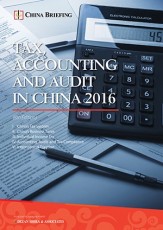An Introduction to Doing Business in China 2016 – New Publication from Dezan Shira & Associates
 An Introduction to Doing Business in China 2016, the latest publication from Dezan Shira & Associates, is out now and available for complimentary download through the Asia Briefing Publication Store.
An Introduction to Doing Business in China 2016, the latest publication from Dezan Shira & Associates, is out now and available for complimentary download through the Asia Briefing Publication Store.
In the 30 years since Deng Xiaoping’s “reform and opening-up” policy of 1978, China’s GDP has developed at an unprecedented rate, averaging 10 percent growth per annum. However, the relentless momentum of investors turning their sights towards China has softened of late. A slowed GDP growth of 6.9 percent in 2015 – the lowest in 25 years – combined with stock market volatility has caused alarm among observers. FDI into China’s manufacturing sector, for example, came in at US$39.54 billion last year, a slight drop from 2014 (US$39.94 billion) and accounting for 31.4 percent of the total.
However, while some of these fears are grounded in reality, others are overblown. After decades of rapid growth and development, the Chinese economy is inevitably changing. The Middle Kingdom is undergoing a major overhaul, transitioning to have a service and consumption driven economy rather than one based purely on manufacturing and export. This transition is not unconditionally negative for the country’s competitiveness, and is understandably changing the way in which investors approach and operate in the country.
Doing Business in China, updated in June 2016, is designed to introduce the fundamentals of investing in China. Compiled by the professionals at Dezan Shira & Associates, this comprehensive guide is ideal not only for businesses looking to enter the Chinese market, but also for companies who already have a presence here and want to keep up-to-date with the most recent and relevant policy changes.
Doing Business in China 2016 covers the following:
- Establishing and Running a Business
- Tax, Audit and Accounting
- Human Resources and Payroll
Within these chapters, we discuss a range of different topics that affect does business in China, including investment models, intellectual property considerations, key taxes applicable for foreign companies, and various types of employment contracts. In addition, we examine how a foreign entity can convert its representative office (RO) into a wholly foreign-owned enterprise (WFOE), and discuss how to legally terminate an employee in China.
|
Asia Briefing Ltd. is a subsidiary of Dezan Shira & Associates. Dezan Shira is a specialist foreign direct investment practice, providing corporate establishment, business advisory, tax advisory and compliance, accounting, payroll, due diligence and financial review services to multinationals investing in China, Hong Kong, India, Vietnam, Singapore and the rest of ASEAN. For further information, please email china@dezshira.com or visit www.dezshira.com. Stay up to date with the latest business and investment trends in Asia by subscribing to our complimentary update service featuring news, commentary and regulatory insight. |

 Selling, Sourcing and E-Commerce in China 2016 (First Edition)
Selling, Sourcing and E-Commerce in China 2016 (First Edition)
This guide, produced in collaboration with the experts at Dezan Shira & Associates, provides a comprehensive analysis of all these aspects of commerce in China. It discusses how foreign companies can best go about sourcing products from China; how foreign retailers can set up operations on the ground to sell directly to the country’s massive consumer class; and finally details how foreign enterprises can access China’s lucrative yet ostensibly complex e-commerce market.
 Tax, Accounting, and Audit in China 2016
Tax, Accounting, and Audit in China 2016
This edition of Tax, Accounting, and Audit in China, updated for 2016, offers a comprehensive overview of the major taxes that foreign investors are likely to encounter when establishing or operating a business in China, as well as other tax-relevant obligations. This concise, detailed, yet pragmatic guide is ideal for CFOs, compliance officers and heads of accounting who must navigate the complex tax and accounting landscape in China in order to effectively manage and strategically plan their China-based operations.
 A Guide to China’s Free Trade Zones
A Guide to China’s Free Trade Zones
In this issue of China Briefing magazine, we examine China’s four Free Trade Zones and discuss the differences and strongpoints that exist in each of them. We begin by providing an introduction to the FTZs, and then take an in-depth look at the market access conditions, registration procedures and tax environments of each. Finally, we highlight some of the key considerations that foreign companies should be aware of when choosing an FTZ to invest in.
- Previous Article Up in Smoke: Why China has Banned Foreign Investment in the Tobacco Industry
- Next Article China’s Work-related Injury Insurance Scheme – Empowering Employees and Employers Alike



























